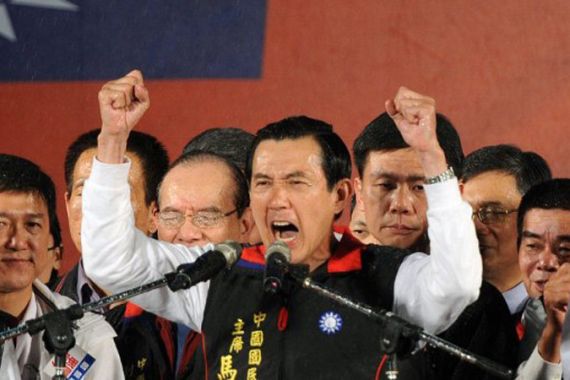Incumbent president wins Taiwan election
Ma Ying-jeou seals second term in office, securing more than 50 per cent of votes and promising closer ties with China.

Taiwan’s incumbent president Ma Ying-jeou has sealed a second term in office after his ruling Kuomintang (KMT) party won the island’s presidential election.
“We’ve won,” a jubilant Ma, 61, told crowds of supporters gathered at his campaign headquarters in central Taipei, the capital, after vote counting showed him securing 51.6 per cent of the vote with 90 per cent of ballots tallied.
“In the next four years, ties with China will be more harmonious and there will be more mutual trust and the chance of conflict is slimmer.
“I will ensure a sustainable environment for peace for Taiwan.”
The honorary chairman of the party said that the victory was the result of a unified effort and “didn’t come easily”.
Al Jazeera’s Steve Chao, reporting from Taipei, said Ma benefited from the island’s strong economic showing in recent years, mostly due to its growing trade with China.
“He told supporters this victory is truly an indication that he is on the right track. He said he will continue to make history by pursuing closer ties with China,” Chao said.
Defeat conceded
Ma’s main challenger Tsai Ing-wen, a 55-year-old China-sceptic, conceded defeat after her disappointing showing and announced she would step down as chairwoman of the Democratic Progressive Party (DPP).
“We accept the Taiwan people’s decision and congratulate President Ma,” she told party supporters.
|
|
“We want to give our deepest apology to our supporters for our defeat.”
Voters appeared drawn to Ma’s vision of better relations with China over Tsai’s attempts to galvanise resentment over growing income inequality and undermining of Taiwan’s sovereignty.
A third candidate, James Soong, a former heavyweight in Ma’s KMT party, had just 2.8 per cent of the vote.
Ma has staked his re-election on his success in tying Taiwan’s high-tech economy closer to China’s lucrative markets, while Tsai has attempted to galvanise resentment over growing income inequality and undermining of Taiwan’s sovereignty.
Voting closed at 4pm local time on Saturday with about 80 per cent of Taiwanese believed to have taken part in the polls.
Taiwan’s sovereignty
Tsai had promised stable ties with China, while Ma campaigned on his record, since assuming power in 2008, of swiftly improving ties with China, culminating with a sweeping trade pact signed one and a half years ago.
Al Jazeera’s Melissa Chan, reporting from Beijing, said officials in China were “breathing a sigh of relief” because of the victory for the pro-China Ma.
“It’s certain that Chinese leaders are happy about this result. They haven’t said which candidate they support in recent weeks, but from a strategic standpoint, what the Chinese are comfortable with is Ma.”
Chan continued: “Ma is a known quality for Beijing. The situation has been stable [during his time in office] and they want that status quo to continue.”
Taiwan has governed itself since 1949, but China claims it as part of its territory, and has never ruled out the use of force to bring about reunification.